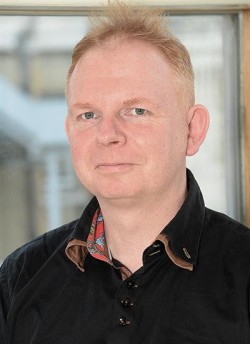Patrick completed a Magister Artium (pre-Bologna reform) in Cultural Anthropology, Indonesian Philology, and Philosophy from the University of Cologne and a PhD in Social Anthropology from Martin Luther University Halle-Wittenberg. His research, writing and teaching seek to advance our understanding and critique of colonial, plantation-driven racialised capitalism and postcolonial, sweatshop-labour driven neoliberal capitalism. Patrick works on the historical political economy of colonial plantation regimes, racialised capitalism, gendered super-exploitation, and neoliberalism in postcolonial special economic zones. His publications further cover the invention of tradition debate, the anthropology of tourism, secular rituals, and prospects for an antifascist anthropology.
Patrick is lead-editor of FocaalBlog, one of the longest-running blogs in social anthropology, and serves on the editorial boards of Focaal – Journal for Global and Historical Anthropology and Social Analysis as well as for Marxism & Sciences, a journal edited by colleagues in Turkey and across the Global South. He is also co-founder and current President of the Commission on Global Transformations and Marxian Anthropology in the International Union of Anthropological and Ethnological Sciences/World Council of Anthropological Associations.
Research
Patrick completed a Magister Artium (pre-Bologna reform) in Cultural Anthropology, Indonesian Philology, and Philosophy from the University of Cologne and a PhD in Social Anthropology from Martin Luther University Halle-Wittenberg. His thesis, Manifestations of Globalisation. Capital, State, and Labour in Mauritius, 1825 – 2005, develops a global historical anthropology that advances the understanding and critique of colonial, plantation-driven racialised capitalism and postcolonial, sweatshop-labour driven neoliberal capitalism. Patrick’s second major research project, The Otherwise Neoliberal. Special Economic Zones in a Global History of Capitalism, uncovers neoliberalism as a political economic praxis that emerged on the peripheries of the world economy; in the Special Economic Zones of 1940s Puerto Rico and 1960s Singapore and Taiwan, for example, to today’s more than 5,000 zones in 147 nations. Focused on the escalation of exploitation of more than 100 million workers in zone factories today, this project counters neoliberal fictions from World Bank and other international organisations’ researchers as it shows the real-world negative impact on workers’ livelihoods and the huge social welfare expenses caused by the zones.
Publications
Journal articles
Chapters
This page is a shortened version of a BU academic profile. To view the complete profile, visit our Staff Profiles site.
